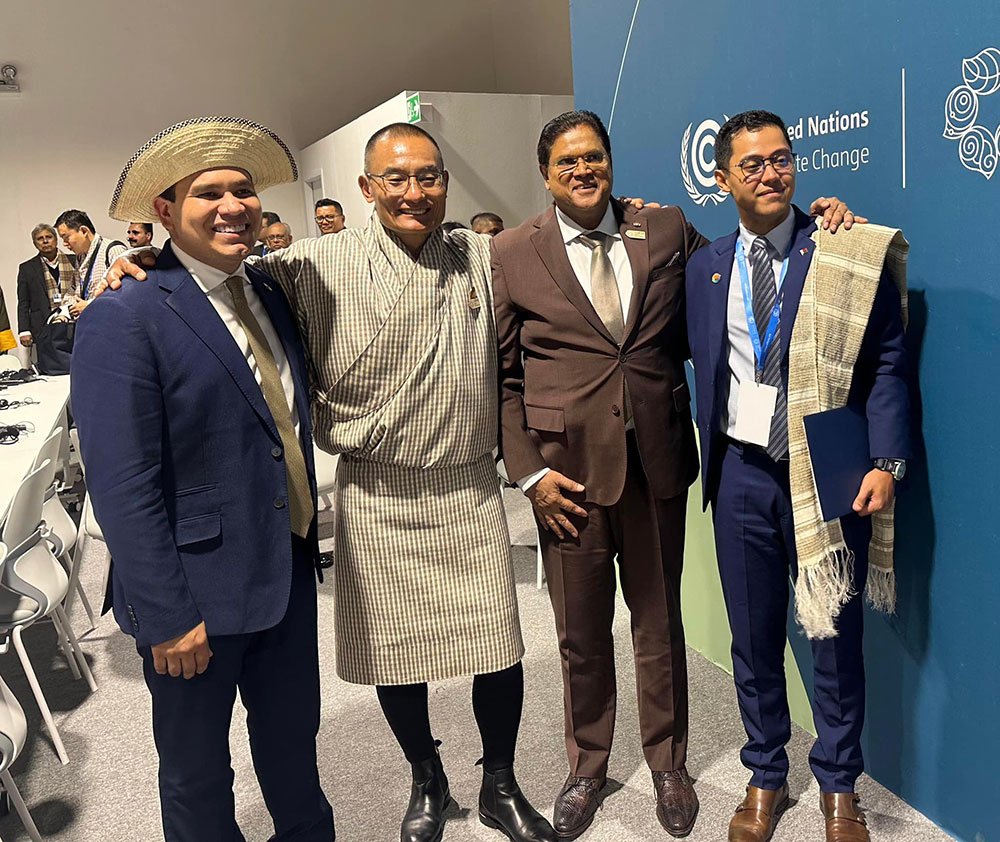Prime Minister Tshering Tobgay is credited with founding of the coalition
Yangyel Lhaden
Baku, Azerbaijan—As countries around the world struggle to reduce greenhouse gas emissions, a group of four carbon-negative and carbon-neutral countries has launched a new forum at COP29, aimed at advancing global climate action. The initiative, called G-ZERO, was launched yesterday at the ongoing climate summit in Baku.
The founding members of the G-ZERO coalition—Bhutan, Madagascar, Panama, and Suriname—are among the few countries that have achieved status of being carbon neutrality or negative emissions.
Each has a proven track record of reducing emissions while promoting sustainable practices, with an emphasis on balancing economic growth and environmental responsibility.
The forum’s central goal is to prove that carbon neutrality is not only possible but essential, advocating for intensified climate action and greater international cooperation, particularly between developing and developed countries.
The term ‘G-ZERO’ refers to a state where a country’s greenhouse gas emissions are fully offset by the amount it absorbs from the atmosphere, or where emissions are lower than absorption levels.

Four carbon negative and neutral countries launches G-ZERO Forum
The G-ZERO initiative aligns with the Paris Agreement, the Kunming-Montreal Global Biodiversity Framework, and the world leaders’ Pact for the Future. It urges nations to increase their ambitions for cutting emissions in line with the 1.5 degree Celsius target by 2035 and to address the pressing planetary crisis of climate change, biodiversity loss, and pollution.
Prime Minister Tshering Tobgay, who is credited with founding the coalition, emphasised the strategic significance of G-ZERO at the launch.
“The launch of G-ZERO is a historic milestone and a testament to the strength of global partnerships,” the Prime Minister said. “In the pre-industrial era, all nations had negative carbon footprints. Today, only a few of us remain carbon-neutral or negative. G-ZERO embodies the possibility of economic growth coexisting with environmental sustainability.”
The Prime Minister said that carbon neutrality and negative emissions were not accidental but rather the result of intentional choices to conserve natural resources.
He called upon larger economies to recognise that smaller nations could set powerful examples of environmental stewardship: “Our message is clear—small nations can be leaders in sustainable growth. G-ZERO demonstrates that what we have achieved on a smaller scale is within reach for others as well.”
The G-ZERO founding members also highlighted the urgent challenges that carbon-neutral countries face due to climate change, despite their negligible contributions to global emissions.
Leaders from the coalition shared the devastating impacts of climate change in their regions, from biodiversity loss to intensified natural disasters, and stressed the need for sufficient financial support to address these growing challenges.
In addition to advocacy, G-ZERO aims to foster mutual support among its members by sharing policy solutions, technical expertise, and sustainable strategies. The coalition calls for increased global funding for climate action, technology transfer, and inclusive policies that empower developing nations and protect vulnerable communities.
The launch of G-ZERO brought together heads of delegations from the four founding countries alongside high-level representatives from key partners, including the United Nations Development Programme, United Nations Environment Programme, Food and Agriculture Organization of the United Nations, the UN Secretary-General’s Office, Global Environment Facility, and Planet Labs, among others.
The founding members have extended an open invitation to other countries to join this coalition, encouraging global participation in the mission to create a truly carbon-neutral future.
The G-ZERO will operate with a rotating presidency, supported by a permanent Secretariat based in Bhutan.
This story was produced as part of the COP29 Climate Change Media Partnership, a journalism fellowship organised by Internews’ Earth Journalism Network and the Stanley Center for Peace and Security.


